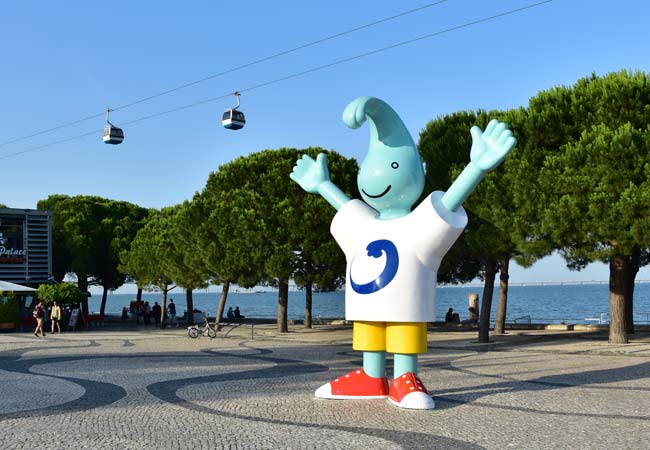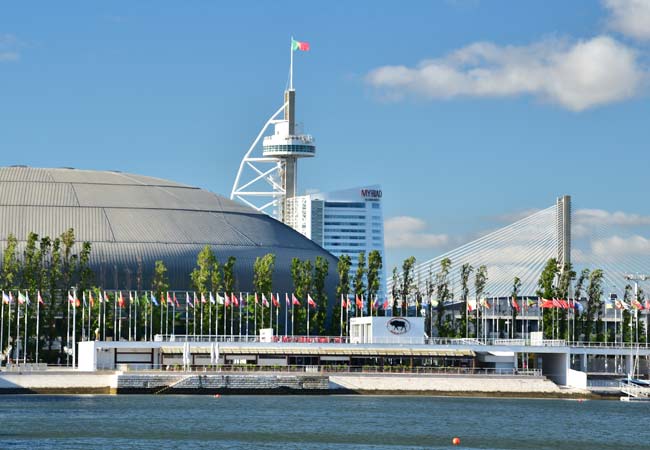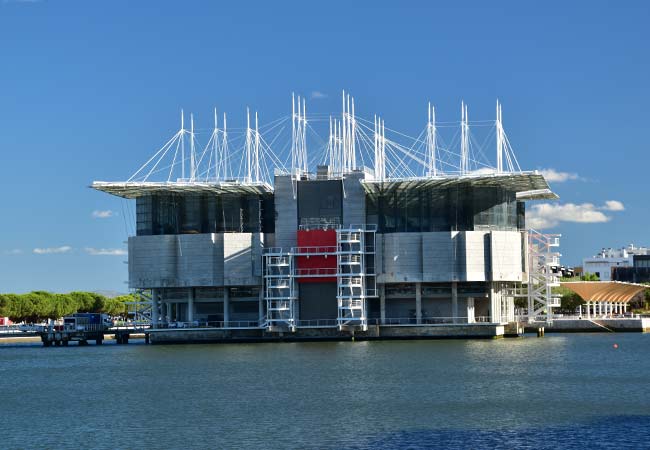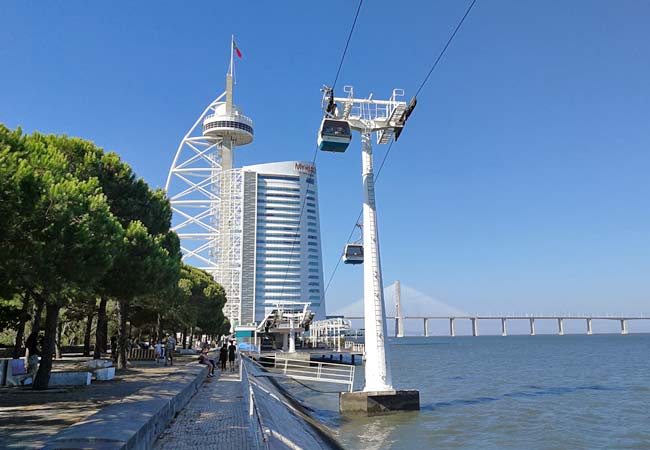LisbonLisboaPortugal.com
The best independent guide to Lisbon
LisbonLisboaPortugal.com
The best independent guide to Lisbon
Expo 98, Lisbon
Expo 98 was a World Trade Fair hosted in Lisbon between May and September 1998.
The project brought massive investment to Lisbon's ageing infrastructure and completely revitalised a poor district, which has since been transformed into one of the trendiest areas of the city.
It is general considered that Expo 98 was a great success, unlike many subsequent expo events. One lasting benefit was the recognition of Portugal as an emerging industrial nation, and this single event may have helped the country join the Euro (the currency of Europe).
Expo 98 was planned to coincide with the 500th anniversary of Portugal's greatest seafaring expedition - Vasco da Gama's arrival in India in 1498.
Though Expo 98 was only open for four months, the planning and organising started almost a decade before the event.
After Expo 98, the area was transformed into Parque das Nações (the Park of Nations), and today it is a popular area with tourists, boasting bars, restaurants and the magnificent Oceanarium.
Related articles: A tourist guide to the Parque das Nações

Gil, the mascot of Expo 98 was named after the Portuguese explorer Gil Eanes
The preparation for Expo 98
The theme chosen for Expo 98 was the "world's oceans", which also aligned with the 500th anniversary of Vasco da Gama's voyage. Water was a key feature though out the design of the exhibit halls and venues. The two people placed in charge of the celebrations were Antonio Mega Ferreira and Vasco Graça Moura.
They in 1989 sort the backing of the government to fund the application to host the 98 Expo. Lisbon's major rival during the biding was Toronto, but it was awarded to Lisbon in 1992.

The main buildings of the Expo site; the Torre Vasco da Gama, the Vasco da Gama bridge and the Altice Arena
The construction of the park was controlled by the state company "Parque Expo" and was headed by two commissioners: Antonio Cardoso e Cunha (1992-1997) and José Torres Campos (1997-1998).
The aim of the commission was to ensure that there was no cost to Portugal to host the event, and all investment could be recouped. All the expenses in the construction were covered by the ticket sales, and the revenue generated by renting the exhibit halls to foreign countries who wished to promote themselves.
The commission delivered the entire project at minimal expenditure to the population of Portugal, and unlike the next countrywide project of Euro 2004, it did not saddle the country with vast debt.
In preparation for Expo 98, the infrastructure of Lisbon was greatly improved, to reflect the prosperous and dynamic country Portugal wanted to portray.

The Oceanário de Lisboa is the centre piece for the modern Parque das Nações, and one of the best tourist attractions of the city
The largest project was the construction of the Ponte Vasco da Gama, a 15km bridge that extends eastwards over the Tejo Estuary and was the background to the Expo site. As part of the Expo, the Red metro line and its seven stations were constructed, which connected the historic centre of Lisbon to the Expo site and, since 2013, to the airport.
Expo 98 passed without any major technical or political issues. During the period when the park was open, 22 May to 30 September 1998, over 11 million people visited the site to view the 155 countries and organisations that were represented.
Ticket prices were $34 for a one-day entrance, and all of Lisbon's population were given a free one-day pass.
The legacy of Expo 98
The site was closed for 6 months after Expo 98, and the district was rebranded as the Parque das Nações. All of the specially constructed buildings of Expo 98 were sold to developers before the Expo so that none of the exhibit halls would be left semi-abandoned.
Major developments which occurred immediately after the Expo was the main entrance building being converted into the Vasco da Gama Shopping Centre and the Utopia Pavilion converted into Pavihao Atlantico Lisbon's indoor arena.

The Parque das Nações is a pleasant place to visit on a hot summer’s day
During the 20 years after Expo, Parque das Nações has transformed into one of the trendiest addresses in Lisbon, tall ultra-modern apartment blocks were built, and the park is now home to 150,000 people. There is a buzz about the area; gone are the days when the park felt like an empty construction site with empty stalls and buildings, every rental is taken, and the park is full of visitors.
Parque das Nações is constantly growing, the Casino Lisboa has recently opened, and the Torre Vasco da Gama has been converted into a five-star hotel. Even with all of this growth, it is still pleasant to promenade along the river under the cool of the trees puzzling at the modern art.
Discover more of Lisbon with our most popular guides
If you've found our content valuable, we'd welcome your support.
The digital publishing landscape has evolved significantly. As a small independent publisher, we face growing challenges. Search engines increasingly favour paid content over organic results, while AI-generated content often reproduces original work without attribution.
To support our work, please consider bookmarking this page (press Ctrl + D) for quick access. If you find an article helpful, we'd be grateful if you'd share it with friends on social media.
For specific questions, please see our Reddit community at r/LisbonPortugalTravel.
Should you notice any outdated or incorrect information, please contact us at [email protected]
Thank you for helping us continue to provide valuable content in an increasingly challenging digital environment.
A complete list of all of our Lisbon articles
If you've found our content valuable, we'd welcome your support.
The digital publishing landscape has evolved significantly. As a small independent publisher, we face growing challenges. Search engines increasingly favour paid content over organic results, while AI-generated content often reproduces original work without attribution.
To support our work, please consider bookmarking this page (press Ctrl + D) for quick access. If you find an article helpful, we'd be grateful if you'd share it with friends on social media.
For specific questions, please see our Reddit community at r/LisbonPortugalTravel.
Should you notice any outdated or incorrect information, please contact us at [email protected]
Thank you for helping us continue to provide valuable content in an increasingly challenging digital environment.































